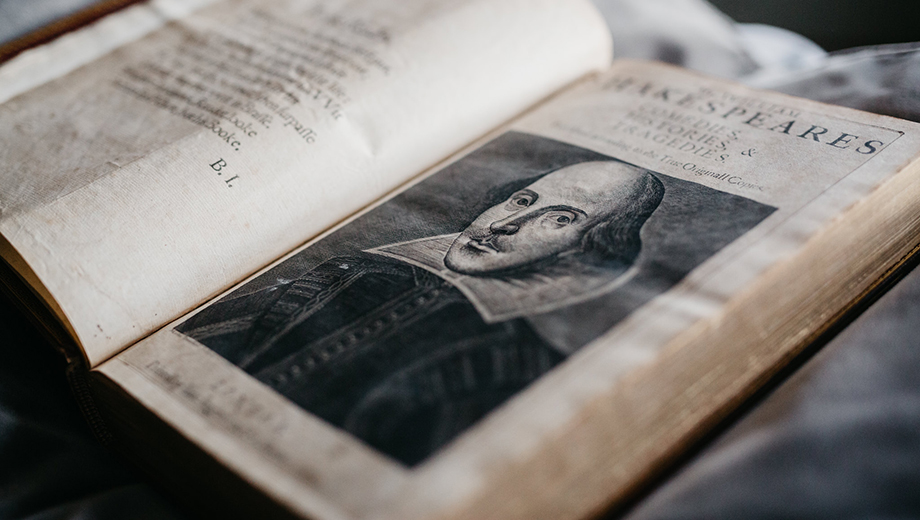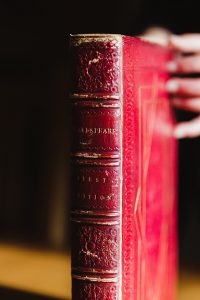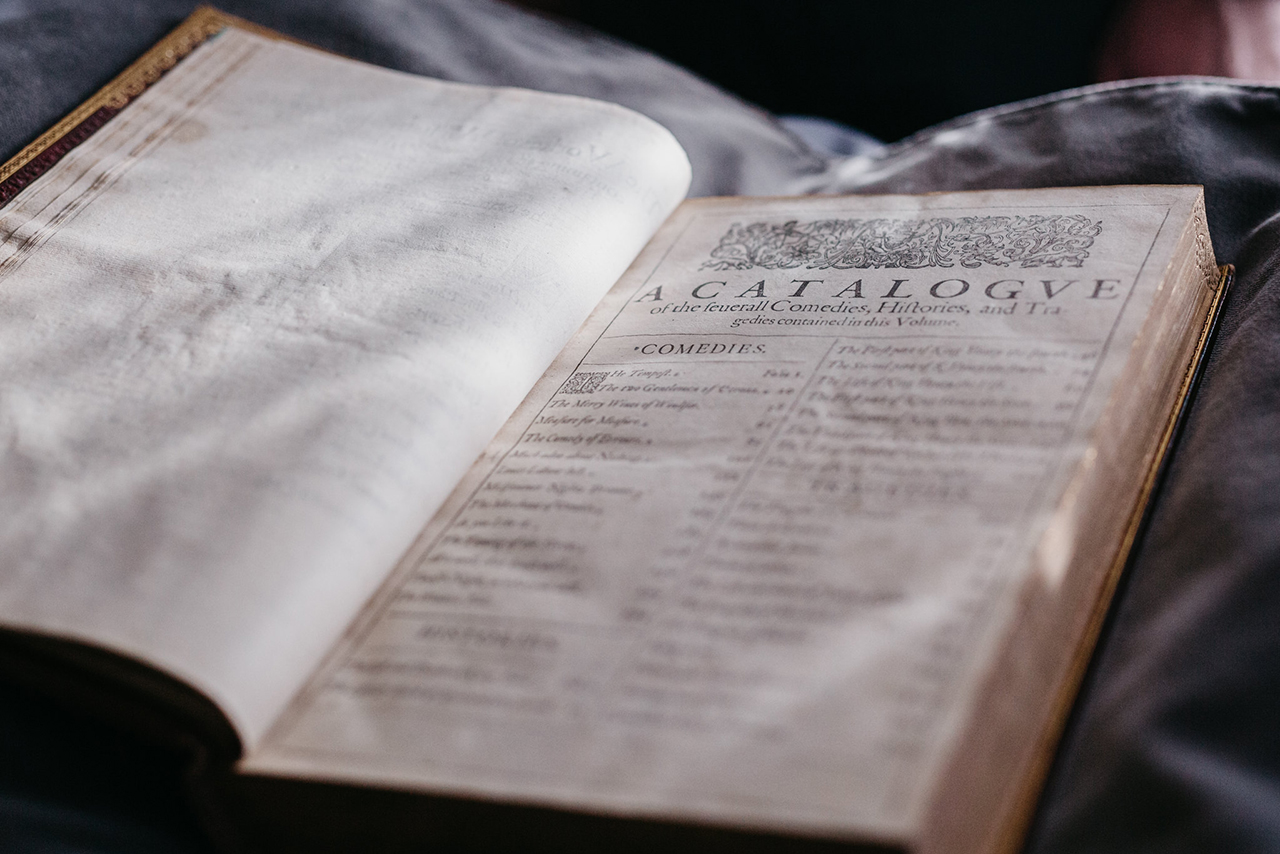UBC is excited to announce the acquisition of a first edition of William Shakespeare’s Comedies, Histories, & Tragedies. Published in 1623, seven years after Shakespeare’s death, the First Folio includes 36 of Shakespeare’s 38 known plays. The texts, edited by Shakespeare’s close friends, fellow writers and actors, are considered the most authoritative of all early printings.
The First Folio, formerly owned by a private collector in the US, was purchased through Christie’s New York with funding provided by a consortium of donors from across North America and with the generous support of the Department of Canadian Heritage.

The title page of Shakespeare’s First Folio at UBC Library
“In comparison to many of our peer institutions, we are a relatively young university library,” says Dr. Susan E. Parker, University Librarian. “We are deeply grateful to the many foundations and individual donors who have been essential in making an acquisition like this possible for a place like UBC Library, and we are honoured to be its caretakers.”
When the opportunity came up in early 2021 to purchase a First Folio, Katherine Kalsbeek, head of Rare Books and Special Collections (RBSC) at UBC Library knew that with so few copies of the First Folio left in private hands, the library had to seize this chance. “The First Folio is a cornerstone of English literature and with this donation, we are able to bring this cultural treasure into public ownership,” Kalsbeek said. “Adding a First Folio to the UBC Library collection represents a milestone in terms of our development as both a library and as a university.”

The book spine of Shakespeare’s First Folio at UBC Library.
Named for the large and luxurious format in which it was printed, the First Folio is an extremely rare book. Most of the 235 copies of the First Folio that remain around the world are either in the United Kingdom or the United States, and on the west coast there are only nine copies in public collections – all in California. This cultural treasure is only the second copy in Canada.
“Preserving this precious book in UBC Library makes it accessible for future generations, inspires new knowledge, and furthers our commitment to engage in world-class research in the arts and humanities,” says Santa J. Ono, UBC president and vice-chancellor.
“The Folio was produced in a rapidly changing cultural economy in which printed artifacts, such as the Folio, began to displace, in popular culture, the largely oral culture of the stage and what had preceded it,” says Dr. Linc Kessler, associate professor of First Nations and Indigenous Studies, “As a Shakespeare scholar who has sought to understand the relationship of printed culture to the largely oral culture of my Indigenous grandparents and many others, I have consistently thought about that transition, its aftermath, and the value of better understanding it in understanding the many interactions of people, histories, and cultures that form our lives today.”
UBC’s acquisition of the Folio has placed this tangible piece of humanity’s heritage within striking distance for an enormous number of people who might never otherwise have had access to it.

The Catalogue (table of contents) of Shakespeare’s First Folio at UBC Library.
“Having the book here in Vancouver in 2021 on the unceded lands of the Musqueam peoples allows us to do what scholars around the world have been doing for a while now, and that is to think about Shakespeare’s work in place-based terms. The book’s presence here will provide us with opportunities to think about how Shakespeare’s works have been agents of colonialism and provoke us to think about the ways in which Shakespeare’s plays can help us think through local iterations of global questions about sexuality and gender, religious tolerance, politics and power, race and social justice, and even climate justice,” says Dr. Patricia Badir, Professor of English and Head of the Department of English Language and Literatures at UBC.
“Arguably, fewer books have been invested with as much magic, and one of the things that this book is going to allow us to do is to literally touch the past and come into a very different type of contact with 17th century England,” says Dr. Dennis Austin Britton, Associate Professor in the department of English Language and Literatures at UBC. “One of the things that I’m excited to do with my students is to look at how the First Folio was actually arranged. When we encounter Shakespeare today in our classes, students usually buy single edition text or anthologies that are very heavily annotated with lots of lengthy introductions, and that’s not the way in which Shakespeare’s readers—at least the First Folio readers—would have encountered Shakespeare’s plays.”
Aligned with a mandate to ensure public access to this unique volume, UBC’s Department of Theatre and Film, the Emerging Media Lab at UBC, and the Master of Digital Media Program at the Centre for Digital Media plan to collaborate on an augmented reality mobile application. UBC’s digital media plan for the Folio will not only engage new communities, but will amplify the value of one of the world’s most precious cultural treasures and make the wonder of Shakespeare relevant and accessible to everyone.
“This is something the whole community can get excited about and can rally around: the first printing of almost half of Shakespeare’s plays that would have been lost were it not for this book. It’s important to history, culture, and literature for so many people,” says Dr. Gregory Mackie, Associate Professor in the department of English Language and Literatures at UBC and Norman Colbeck curator at RBSC. “It’s a tremendous moment for Arts at UBC. There are so many areas of the university that have played a role and stand to benefit. This is also a major acquisition for Canada as this Folio is being brought into the public realm and will be preserved and made accessible not only for the citizens of BC, but also for all Canadians.”
UBC is ideally positioned to partner with British Columbian arts and cultural institutions such as the Vancouver Art Gallery to ensure an unprecedented level of public access and exposure to this treasured artifact.
“This is really a gift, not just to UBC, but also to the City of Vancouver and to the many people in the Pacific Northwest who appreciate Shakespeare. We thought it was very appropriate that we partner with the Vancouver Art Gallery to present it to the people before it comes ultimately to UBC to support research and teaching,” says Kalsbeek.
In partnership with the Vancouver Art Gallery, this tangible piece of cultural heritage will be exhibited to the public from January 12 to March 22 along with three subsequent seventeenth-century Folio editions of Shakespeare’s plays. The exhibition, For All Time – The Shakespeare FIRST FOLIO marks the first time that all four Folios have been presented in Vancouver. The exhibition will be accompanied by an audio mobile guide featuring the voice of Christopher Gaze, Founding Artistic Director, Bard on the Beach Shakespeare Festival, in addition to a series of public programs, including talks, performances and more. For further information, please visit vanartgallery.bc.ca.
View a curated photo collection of Shakespeare’s First Folio at UBC Library.
Media contacts
Michelle Blackwell
Director, Communications & Marketing, UBC Library
Tel: 647.688.3856
michelle.blackwell@ubc.ca